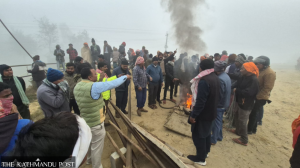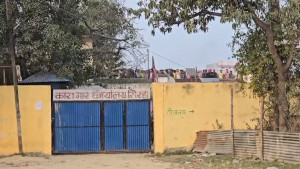Madhesh Province
Sweet hopes of bringing Birgunj Sugar Mill back to life turn bitter
State-owned facility remains shut since 2003 after a row of incompetent political appointees ran it into the ground.
Shankar Acharya
Hopes of bringing the state-owned Birgunj Sugar Mill back to life have receded for lack of government will.
Once a flourishing public enterprise, the factory has been shuttered since 2003 after a succession of incompetent political appointees ran it into the ground.
The government has several times decided to operate the mill under a cooperative model, a move largely aimed at dismantling the monopoly of the sugar cartels. But months and years have passed, and nothing has happened.
All the company's property, including factory machinery, furniture and buildings, are in a dilapidated state.
The company started on its path to ruin on February 16, 2000 when the Cabinet decided to privatise it. The factory was eventually shut down on February 23, 2003.
Birgunj Sugar Mill was established in 1964 with aid from the then Soviet Union. It is spread over 65 bighas (44 hectares) in Birgunj of Parsa district.
During its heyday, the factory employed up to 2,200 workers. It had the capacity to crush 1,500 tonnes of sugarcane and produce 1.5 tonnes of sugar and 4,500 litres of rectified spirit per day.
After the closure of the factory, 731 permanent employees were given compulsory retirement.
However, 193 employees declined to resign. Nor did they accept their severance pay. They rather filed a lawsuit at the Supreme Court demanding payment of their salaries and other benefits, arguing that the remuneration provided by the government was too low.
Although the disgruntled workers have held several rounds of talks with the government, no solution has been found.
The government still pays the salaries of 17 employees who look after the mill, all of whom have been appointed on a contract basis. The government spends about Rs350,000 on their salaries monthly.
The factory's land is being fragmented. The government has given 6 bighas on the south side to the Armed Police Force. Two years ago, it decided to give 4 bighas of temporary land in Birgunj and 2 bighas of land to the Office of the High Court for the construction of a building.
The High Court has been operating on the factory premises for the last four years.
The company also owns 30 ropanis and a building in Baluwatar, Kathmandu.
Awadh Kishore Singh, administration manager of the factory, said that the Ministry of Finance had given the building and land to construct an office building of the National Planning Commission.
The mill has another 2 bighas (1.35 hectares) of land, including the service centre and its building, at various places in Bara and Parsa.
Singh, who was once a permanent employee of the factory, is currently serving under a contract basis. “The factory had to face a financial crisis and eventually it was closed down,” Singh recalls. “It suffered a financial crisis immediately after Rs100 million was distributed from the reserve fund of the mill to 700 employees who got retired.”
According to him, the government decided to shut down the mill that was in operation.
“If the government had thought about the future of the factory and its needs, the mill probably wouldn’t have died,” he said.
When the factory was in operation, it used to buy sugarcane from 12,000 to 15,000 farmers.
As sugarcane was a cash crop, it had a big impact on the living standard of farmers. The factory was taking care of 2,000 employees’ families, and after its closure, many families fell on hard times.
The big losers were the sugarcane farmers.
Saharum Raut, a sugarcane farmer of Parsa, said that private sugar mills started to operate after the closure of Birgunj Sugar Mill.
Sugarcane farmers hoped that their good days would return with the opening of a series of private mills. But the private mills gave the sugarcane farmers a hard time.
“These mills have been harassing farmers for years. They don’t pay on time,” said Raut. “Many farmers frustrated by the mills stopped cultivating sugarcane.”
Raut said that if the government reopens Birgunj Sugar Mill, it will greatly benefit the farmers.
Around 2,000 families in the area were operating hotels, shops and businesses.
The factory was making an annual profit of around Rs60 million till 1993, except during the initial two to three years of operation.
But soon after the government started to make political appointments and send people with barely any experience, the collapse of the mill was inevitable, former employees say.
In 1990, the government decided to inject Rs200 million into the mill, but the money was never released.
Then in 2003, the Ministry of Finance invited bids to privatise the factory.
However, the privatisation process never bore fruit due to political instability and frequent changes in government.
After the Maoist government came to power, the then prime minister Pushpa Kamal Dahal had planned to put the factory back into operation.
A team of experts was sent to the factory to study its condition. They submitted a report to the then finance minister Baburam Bhattarai but nothing was done.
When Anil Jha was industry minister, a steering committee was formed under the leadership of Raj Kumar Singh. However, the committee could not do anything.
At the same time, leaders affiliated with various parties started protests and organised demonstrations for the re-operation of the factory in Birgunj. That struggle too failed.
“There are many reports on the shelves of the Finance Ministry. None of the recommendations has been studied,” Singh said.
He said that no committee had been able to say clearly which modality was suitable for the re-operation of the factory.
Engineer Baijunath Rauniyar, a resident of Birgunj Ghantaghar, said that it was unfortunate that no government could take concrete steps to reopen Birgunj Sugar Mill despite repeated assurances.
"The physical assets of the factory are still very safe. The government should have the will to reopen it,” he said. "The government should make long-term plans. All three levels of government need to be serious about this matter.”




 10.12°C Kathmandu
10.12°C Kathmandu












